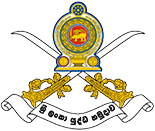Mr B.M.U.D Basnayake, Secretary Defence in his inaugural opening remarks to the ‘Defence Seminar - 2015’ session at Galadari Hotel this morning (1) said that in the 21st century national security challenges differ in form and combating such threats requires not only efforts but also cooperation, coordination and collaboration among countries with the ever increasing frequency of conflicts.
He also noted that in today’s context, threats are posed to national security not only from traditional nation states but from non state actors including terrorist networks and organized groups engaged in various criminal activities. A range of complex challenges emerging from rapid technological developments, sweeping demographic changes and accelerating environmental degradation also have an impact on national security, he said.
“Although the defeat of the terrorists in May 2009 paved the way for peace and for rapid post conflict development, our security forces and law enforcement agencies must remain vigilant about emerging threats including drug smuggling, human trafficking, and organized crime. Those engaged in transnational crime especially make increasing use of technological advances to stay ahead of the national security apparatus. Combating such groups not only requires effort on the part of individual Governments, but cooperation, coordination and collaboration amongst countries,” Mr Basnayake noted.
The 21st century has been labelled as the Information Age, where the availability and accessibility of information has reached unprecedented levels. This has expanded the contexts from which national security challenges can emerge. Cyber warfare, cyber espionage and cyber exploitation are new threats to national and global security. The risk profile of Governments, organisations and individual citizens have all increased with the increase in electronic availability of sensitive data that is vulnerable to talented hackers. This is another area about which nations must now be vigilant, he went on to say.
Here follows the full text of his speech;
“It is a great pleasure for me to speak with you this morning, at the Opening Ceremony of the Defence Seminar 2015 organized by the Sri Lanka Army. At the outset, I congratulate Lieutenant General Chrishanthe de Silva, Commander of the Army, and the officers and personnel involved in organizing this event for the excellent arrangements made. The theme of this Seminar is “"National Security in the Context of Emerging Global Threats". I consider this theme to be a topical and important one.
The ‘Defence Seminar’ of the Sri Lanka Army was devised in 2011 as an annual international forum that aimed to illustrate Sri Lanka’s rise and development in the post-conflict scenario.
The very first Defence Seminar showcased the Sri Lankan experience in defeating terrorism, while the subsequent seminars examined post - conflict developments & challenges in the local as well as the regional context. As it has evolved, the Defence Seminar has broadened in scope to include a candid discussion of regional and global issues, and it has been enriched by the presence of many knowledgeable and distinguished participants from around the world.
I am very glad to see that this trend is not only continuing but being enhanced this year, with the presence of even more distinguished guests including our keynote speaker His Excellency Hamid Karzai, former President of Afghanistan. I am confident that all of the participants at this seminar will benefit greatly from his wisdom and experience, as well as the knowledge sharing that will take place during the course of this event.
This year’s Defence Seminar encompasses matters that nations need to focus their attention on as a result of security threats developing across the globe. The concept of national security will be considered in its broadest sense, which includes the security of persons, institutions, properties and national territory.
In today’s context, threats are posed to national security not only from traditional nation states but from non state actors including terrorist networks and organized groups engaged in various criminal activities. A range of complex challenges emerging from rapid technological developments, sweeping demographic changes and accelerating environmental degradation also have an impact on national security.
While the frequency of conflicts between states and within states has reduced, the increasing prevalence and power of such non state actors demands our attention. Sri Lanka is no stranger to these dangers, having suffered from nearly three decades of horrific violence at the hands of a brutal terrorist organization. Although the defeat of the terrorists in May 2009 paved the way for peace and for rapid post conflict development, our security forces and law enforcement agencies must remain vigilant about emerging threats including drug smuggling, human trafficking, and organized crime. Those engaged in transnational crime especially make increasing use of technological advances to stay ahead of the national security apparatus. Combating such groups not only requires effort on the part of individual Governments, but cooperation, coordination and collaboration amongst countries.
The 21st century has been labeled as the Information Age, where the availability and accessibility of information has reached unprecedented levels. This has expanded the contexts from which national security challenges can emerge. Cyber warfare, cyber espionage and cyber exploitation are new threats to national and global security. The risk profile of Governments, organizations and individual citizens have all increased with the increase in electronic availability of sensitive data that is vulnerable to talented hackers. This is another area about which nations must now be vigilant.
As we have witnessed across the globe in past decades, natural disasters and environmental issues including climate change also have an impact on the global security agenda. Sri Lanka, too, has experienced natural calamities such as the devastating 2004 Tsunami, deadly floods and landslides, and the increasing uncertainty of weather patterns resulting from climate change. These also constitute threats to national security that need to be addressed systematically. Improving national preparedness to deal with such threats is essential, and countries must look to work collectively through international forums to address this issue on the global scale.
In its own small way, this event is yet another platform for such a collective approach. The two days of the Defence Seminar 2015 will enable our distinguished participants to exchange views, share knowledge, and engage in invaluable networking that will further strengthen regional and international cooperation. To set the stage for this fruitful exchange, it is now my privilege and great honour to introduce to you our very distinguished Keynote Speaker.
His Excellency Hamid Karzai was born to a distinguished family of the Popalzai tribe of the Pashtun people in the Kandahar region of Afghanistan. His father, a distinguished member of the Afghan Parliament under King Mohammad Zahir Shah, was hereditary Khan or chief of the Popalzai. As a young man, Mr. Karzai attended schools in Kandahar and Kabul, and later attended University in India. He was studying in Simla when Afghanistan was invaded and occupied by the Soviet Union. During this troubled period, Mr. Karzai worked with the resistance as an advisor and diplomat, and won the loyalty of the Mujahideen who expelled the Soviets from Afghanistan.
In the aftermath of the invasion, Mr Karzai worked to restore order, serving briefly as Deputy Foreign Minister in the postwar government from 1992 to 1994.
During the 1990s, Mr. Karzai grew increasingly disenchanted with the Taliban movement, emerging as a leader of the Pashtun resistance to the Taliban. Following the September 11th attacks, and the US intervention in Afghanistan, Mr. Karzai was named Chairman of the Interim Administration in December 2001 and later elected President of the Afghan Transitional Administration.
As President, Mr. Karzai survived assassination attempts and the efforts of extremists to disrupt the country's first national election. In September 2004, he was elected to a full five-year term as the first directly elected President in the country's history. Hamid Karzai's tenure as President faced enormous challenges, which he handled with great skill and aplomb, winning reelection in 2009 for a further 5 years. In 2014 Mr Karzai oversaw a peaceful transition from one elected government to another after the election of his successor, His Excellency Ashraf Ghani.
Ladies and gentlemen, this is a very highly summarized profile of our most distinguished Keynote Speaker, which does little justice to his many accomplishments, visionary leadership and erudite character. However, without any further ado, please join me in giving a very warm welcome to His Excellency Hamid Karzai, whom I now cordially invite to address the gathering.”
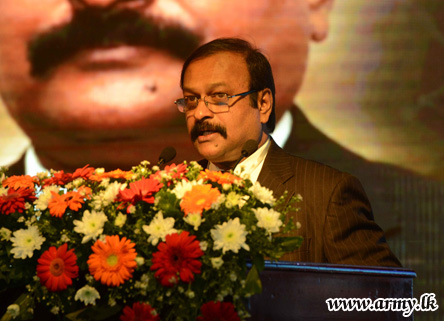 |
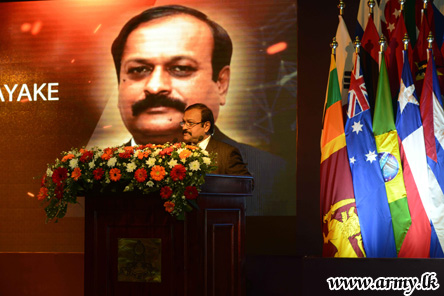 |
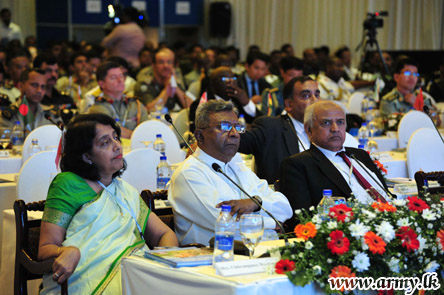 |
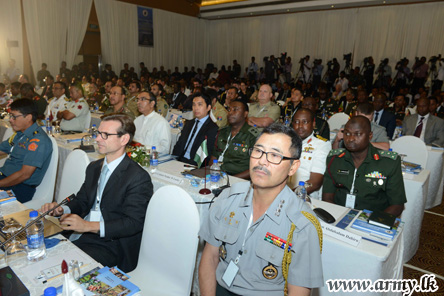 |
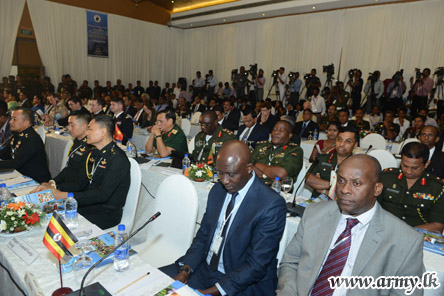 |
